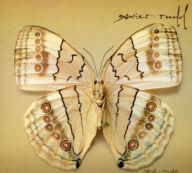White Moth Xavier Rudd Artist
White Moth Xavier Rudd Artist
{|Xavier Rudd|}, the Australian-born surf bum cum multi-instrumentalist and songwriter, has been a critic's darling since he made his earliest forays onto tape back in 2001 with his {|Live in Canada|} offering. {|Rudd|} plays everything from Weissenb...
Read more
{|Xavier Rudd|}, the Australian-born surf bum cum multi-instrumentalist and songwriter, has been a critic's darling since he made his earliest forays onto tape back in 2001 with his {|Live in Canada|} offering. {|Rudd|} plays everything from Weissenborn guitars to didgeridoo, djembe, stomp boxes, and various sundry percussion instruments, and he plays them well. On his initial live offering way back when, the word began to spread. His studio records -- which until now have been inferior to his live performances (big surprise there) -- have gained him stardom in his native land and a slowly and steadily growing fan base in the United States, primarily among his Generation Y contemporaries. His live gigs get bigger and better (he's a true star attraction at {|Bonnaroo|}), and he's begun to craft his songs more tightly and purposefully, as evidenced by his U.S. debut on {|Anti|}, 2005's {|Food in the Belly|}. He's made a career out of ethically correct, socially conscious narratives that have been at times preachy and bordering on trite (but then {|John Mayer|}'s made a career out of it), though his melodies have been infectious and increasingly sophisticated in the manner in which he blends the various {|folk|} musics of Australia, {|rock|}, {|reggae|}, and {|blues|}. While {|Paul Simon|} has clearly influenced him -- especially in his vocal delivery -- one can hear traces of everyone from {|Ben Harper|} to {|Ziggy Marley|} and {|Neil Young|} in his songs. On {|White Moth|} he comes as close as possible to capturing his own live sound, where the immediacy of the performance quantifies with the clarity of the recording studio. Co-produced with {|Dave Ogilvie|} (yep, that one: the {|Skinny Puppy|} founder, producer, and sideman to {|David Bowie|}, {|Marilyn Manson|}, {|NIN|}, {|Moetley Cruee|}, and {|the Genitorturers|} must have found his feminine side), this collection is sincere, catchy, and beautifully and organically recorded in British Columbia -- it's the recording {|Rudd|} has been trying to make since he came in from the waves. That's not to say the lyrics aren't oh-so-politically correct ({|Bruce Cockburn|} offends more people that {|Rudd|} does), because they are, but they're woven into a fabric that is tighter and less concerned with making sure his point is heard than with getting a song across, trusting on some level that meaning is generated in doing so. {|Better People|} is a straightforward homage to social and environmental activists, played on a resonator guitar with a stomp box, {|Dave Tolley|}'s drum kit, and {|Panos Grames|}' Hammond B-3. The bassline comes from {|Rudd|}, playing the bottom strings the way he does live: with more emphasis on the thumbed strings on his fingerpicking hand and mixing them up. The melody is as catchy as anything by {|Simon|}, but without the smarmy New York intellect. {|Set It Up,|} later in the record, is a ghostly {|blues|} about the environment, where the same instrumentation is used, but to a much spookier and grainier result. {|Twist|} is a solid {|reggae|} number that contemplates one's relationships with one's friends, with {|Tolley|} on drums as {|Rudd|} plays everything else: slide on an 11-string Weissenborn, his stomp box, and harmonica. It's a paean to family and friends that works, and the jauntiest thing on the set. While the message of {|Land Rights,|} a haunting {|folk|} song written in sympathy with the indigenous population of Australia's fabled Arnhem Land and featuring backing vocals by members of {|Yothu Yindi|}, is preachy as hell, there is no doubt about its sincerity. And that's where {|White Moth|} differs from its predecessors: there's an authority here that was absent before. Whereas previous recordings were somewhat drippy with sincerity and that guilty-white-boy set of social mores about wanting to put things right, this one is guilt-free and is written as if by a citizen of the human race. This is also true in {|Whispers,|} a song to the ghosts of the past who hover about and speak to the elders to impart their wisdom. It doesn't hurt that, along with the interwoven guitars, {|Kennetch Charlette|} of the Cree Nation Eagle Clan sings and {|Mikayngu Mununggurr|} of the Djapu Clan of Arnhem Land plays the yidaki (didgeridoo). But there are breezier elements, too: the beautiful {|Anni Kookoo,|} melancholy reflections of an old woman on which the only sound accompanying {|Rudd|}'s voice is an acoustic guitar; the familial themes celebrated in the title track; and {|Stargaze|} -- here there is a certain view that is less authoritative and more reflective, almost mystical in places. The tribal moments -- such as {|Message Stick,|} with {|Charlette|} and the Yirrkala CEC schoolchildren, who chant wildly as the track is driven solely by percussion instruments and a pair of yidakis -- are drenched with a kind of citizen's conscience, which is different from the observances of a pseudo-intellectual preaching to the choir. {|Rudd|} is conc
Less




